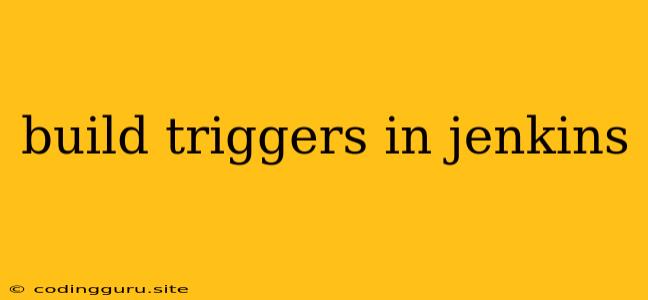Building Triggers in Jenkins: A Comprehensive Guide
Jenkins, a popular open-source automation server, empowers developers and DevOps teams to streamline their software development workflows. One of the key aspects of Jenkins is its ability to automate builds and deployments based on specific events or conditions, known as build triggers.
Build triggers play a crucial role in creating efficient and reliable continuous integration and continuous delivery (CI/CD) pipelines. They allow you to automatically initiate builds based on events like code changes, scheduled intervals, or external events, ensuring that your codebase is consistently tested and deployed.
Why Use Build Triggers in Jenkins?
Build triggers offer numerous advantages:
- Automation: Eliminate manual build initiation, reducing human error and freeing up time for more complex tasks.
- Efficiency: Trigger builds automatically as soon as code changes are detected, minimizing delays and ensuring rapid feedback.
- Consistency: Implement consistent build processes across your entire team, promoting standardization and minimizing variations.
- Reliability: Ensure that builds are triggered under predefined conditions, enhancing the reliability of your CI/CD pipeline.
- Flexibility: Adapt your build triggers to suit your project needs, including multiple triggers for different scenarios.
Types of Build Triggers in Jenkins
Jenkins provides a wide array of build triggers to accommodate diverse development workflows. Let's explore the most common types:
- Poll SCM (Source Code Management): This trigger checks your source code repository periodically for changes. It's ideal for projects with frequent code updates.
- Build periodically: Schedule builds to run at specific times, like daily or weekly, for regular checks or scheduled releases.
- Trigger builds remotely: Allows you to trigger builds from external systems or scripts.
- Build after other projects are built: Trigger a build after another project has completed successfully, enabling dependency management.
- Build when a change is pushed to GitLab: Integrate Jenkins with GitLab to trigger builds automatically upon code push.
- Trigger parameterized builds: Define parameters that can be passed to the build, allowing for flexible build configurations.
- Build on demand: Manually initiate builds whenever necessary, providing on-demand control.
How to Configure Build Triggers in Jenkins
Setting up build triggers in Jenkins is straightforward:
- Access the Jenkins dashboard: Log in to your Jenkins instance.
- Navigate to the job configuration: Select the job for which you want to configure triggers.
- Locate the "Build Triggers" section: In the job configuration page, find the "Build Triggers" section.
- Select the desired trigger: Choose the trigger type that best fits your needs.
- Configure the trigger settings: Depending on the chosen trigger, provide specific settings such as schedule, repository URL, or external trigger details.
- Save the configuration: Save the job configuration with the selected build trigger.
Example: Setting up a Git-based Trigger
To illustrate the process, let's set up a trigger that automatically builds a project whenever changes are pushed to a Git repository:
- Select the job: Choose the Jenkins job you want to trigger.
- Go to the configuration page: Navigate to the job's configuration.
- Choose "Poll SCM" trigger: In the "Build Triggers" section, select the "Poll SCM" option.
- Set the schedule: In the "Schedule" field, enter a cron expression to define how often Jenkins should check the Git repository for changes. For example, "* * * * *" will check the repository every minute.
- Save the configuration: Save the job configuration to activate the trigger.
Now, whenever a change is pushed to the specified Git repository, Jenkins will initiate a build automatically.
Best Practices for Build Triggers
To optimize your build triggers and ensure smooth CI/CD workflows, consider these best practices:
- Specify trigger conditions: Define clear trigger criteria to avoid unnecessary builds.
- Use appropriate trigger types: Choose the right triggers based on your project's requirements and workflows.
- Monitor trigger performance: Analyze trigger execution times and adjust configurations to improve efficiency.
- Document your triggers: Maintain clear documentation on the purpose, configuration, and behavior of each trigger.
Conclusion
Build triggers are an indispensable tool for automating build processes in Jenkins. They empower developers and DevOps teams to achieve consistent and reliable CI/CD pipelines, leading to faster feedback cycles, enhanced productivity, and higher-quality software. By understanding the various types of build triggers, their configuration, and best practices, you can effectively utilize them to optimize your Jenkins workflows and streamline your development process.
